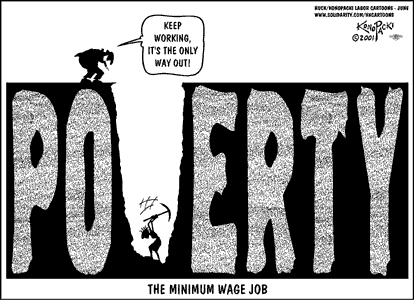Not quite on the radar here, but it could be.
After years of failed proposals in the Texas Legislature to raise the minimum wage, organizers and advocates for higher hourly wages are going local.
Leaders in two major Texas cities and two large counties will vote soon on raising minimum wages for public employees and, in some cases, for employees of private companies that contract or receive financial incentives from local governments.
In Austin, a minimum wage hike to $13.03 an hour for full-time employees will be up for consideration in September as part of the city’s proposed budget. San Antonio leaders will consider a minimum wage of $13 an hour next month. Bexar County is also poised to increase its minimum wage to $13 an hour, while El Paso County could vote next month to boost pay for its lowest-paid employees to $10 an hour. Minimum wages in those localities currently range from $9.45 to $11.66 an hour.
Local organizers affiliated with the Industrial Areas Foundation are hopeful all four proposals will be approved, saying they’ve received assurances from city and county officials. But for these advocates, the wins could mean sending a message to state lawmakers who have been unable to garner enough support to raise the minimum wage statewide.
“We just didn’t see anything happening on this in the legislative session. Nothing is going to happen next year … so we decided to work with local public officials in getting something passed,” said Arturo Aguila, the lead organizer for the El Paso Interreligious Sponsoring Organization and Border Interfaith organization. “We thought that might send a message to the state legislators that cities across the state are already taking the initiative to do this.”
[…]
State law preempts local governments from setting a city or county-wide minimum wage that could require the private sector to increase wages for the lowest-paid employees, but they can set wage requirements for private-sector contractors that do business with them and for local government employees.
This has left advocates for higher minimum wages to pursue local policies that require private companies that contract or receive financial incentives for local government to follow to same minimum wage standards.
In other words, keep your expectations modest. Texas has no state minimum wage, it enforces the federal $7.25 rate. If that were to go up, a disproportionate number of workers here would benefit; as the story notes, Texas has 5.7 percent of all hourly paid workers earning minimum wage or less, while the national average is 3.9 percent. The prospects of anything changing at the state level are grim or worse; Wendy Davis backed implementing a $10/hour state minimum wage law, but that wasn’t exactly a high profile part of her campaign, and it wouldn’t have gone anywhere in a Republican legislature even if she had won. Local action is the best bet for now, just bear in mind that it can’t affect everyone. Here in Houston, Sylvester Turner spoke in favor of a $15 minimum wage – Adrian Garcia also signed the TOP/SEIU platform to “incentivize living wages”, though there was no specific proposal tied to it – but that position will require some clarity. As the Observer reminds us, “city workers now make at least $12 an hour and are expected to make $13.55 by 2018″. Paying city employees a living wage, and requiring contractors who do business with the city to do the same is a no-brainer. Anything beyond that is a laudable goal with a less-clear path. Getting the discussion started is the first step.

